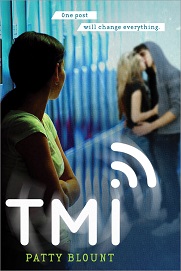2018 School Spending Survey Report
YA Author Explains Why We Need National Bullying Prevention Month
Young adult author Patty Blount was inspired to write her debut novel Send after her son was bullied, and was then accused of being a bully himself. Blount has come to realize that "perception is the root of most bullying."

Credit: Demetriad Studios
When my son was being bullied, my first instinct was to tell him to ignore it: “Don’t pay attention to what other people think.” An early developer, my sixth grader was gripped by all the changes of puberty while his classmates were still little boys. He spent the school term listening to those boys tell him he was a freak, a Sasquatch, a pizza-face, and should die. By the spring, he blurted he no longer wanted to live. We got him immediate help. I thought our story ended happily when the term ended, but then he was accused of being the bully in seventh grade. It’s a visceral reaction, a gut instinct to throw up the steel walls and insist with every breath, “Not my son.” But it’s the wrong reaction. The truth is, it is my child. And yours. If it weren’t, there would be no bullying epidemic. This is a harsh reality. As I listened to the other family’s complaint, I determined my son had no intention of hurting their child. He was playing. But because he was already 5’9” and nearly one-hundred-and-fifty pounds, his size alone was perceived as a threat. It occurred to me then that perception is the root of most bullying. How we perceive others and how others perceive us are so often at odds. I realized telling my son to ignore his bullies was perhaps the worst action I could have taken. It’s like ignoring a leak; the damage builds up over time, eroding confidence. He not only believed the lies, he repeated them, amplifying their negative effects and by seventh grade, he cared far too much about what the wrong people think, the ones who thought he was funny, even when he frightened someone else. The desire to fit in, to have friends, to be accepted, outweighed everything else. My son’s ordeals inspired Daniel Ellison, the main character I wrote about in Send (Sourcebooks, 2012), who is not a mean kid but someone who did a stupid thing because he cared too much about the people who think it’s funny to make fun of others. It’s also why I’m so passionate about bullying awareness, especially among adolescents. I don’t believe all children are cruel. I think they have a hard-wired need for peer acceptance and will do almost anything to satisfy that need, even things they know are wrong.
My son’s ordeals inspired Daniel Ellison, the main character I wrote about in Send (Sourcebooks, 2012), who is not a mean kid but someone who did a stupid thing because he cared too much about the people who think it’s funny to make fun of others. It’s also why I’m so passionate about bullying awareness, especially among adolescents. I don’t believe all children are cruel. I think they have a hard-wired need for peer acceptance and will do almost anything to satisfy that need, even things they know are wrong.  They don’t yet have the ability to appreciate how adverse or permanent the effects of their actions can be on others. My second novel, TMI (Sourcebooks, 2013), deals with issues like these. Our jobs as parents and educators is to help them think through all the consequences of actions that can be amplified online in an increasingly connected world. I also think we can do more to convince bystanders to stand up for victims and use kids’ need for acceptance to break the bullying cycle. In a Journal of Adolescence paper published on peer involvement in bullying, researchers Craig and Pepler reported at least 85% of reported incidents of bullying take place in front of peers, but peers intervened in only 11% of those incidents. Further, when a bystander does intervene on behalf of the victim, bullying stopped in less than ten seconds 57% of the time.
They don’t yet have the ability to appreciate how adverse or permanent the effects of their actions can be on others. My second novel, TMI (Sourcebooks, 2013), deals with issues like these. Our jobs as parents and educators is to help them think through all the consequences of actions that can be amplified online in an increasingly connected world. I also think we can do more to convince bystanders to stand up for victims and use kids’ need for acceptance to break the bullying cycle. In a Journal of Adolescence paper published on peer involvement in bullying, researchers Craig and Pepler reported at least 85% of reported incidents of bullying take place in front of peers, but peers intervened in only 11% of those incidents. Further, when a bystander does intervene on behalf of the victim, bullying stopped in less than ten seconds 57% of the time. Bullying is everybody’s problem and it’s going to take a concerted effort by parents, schools, and communities to solve it. Here are some resources that can help. A website companion to the Bully documentary Encourage the Youth: A blog run by young people giving advice to teens with real issues. Pacer’s National Bullying Prevention Center National Bullying Prevention Month, October, 2013
Bullying is everybody’s problem and it’s going to take a concerted effort by parents, schools, and communities to solve it. Here are some resources that can help. A website companion to the Bully documentary Encourage the Youth: A blog run by young people giving advice to teens with real issues. Pacer’s National Bullying Prevention Center National Bullying Prevention Month, October, 2013 RELATED
RECOMMENDED
CAREERS
The job outlook in 2030: Librarians will be in demand
CAREERS
The job outlook in 2030: Librarians will be in demand
ALREADY A SUBSCRIBER? LOG IN
We are currently offering this content for free. Sign up now to activate your personal profile, where you can save articles for future viewing






Add Comment :-
Be the first reader to comment.
Comment Policy:
Comment should not be empty !!!